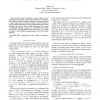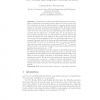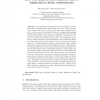28 search results - page 2 / 6 » Power Attack on Small RSA Public Exponent |
FDTC
2009
Springer
14 years 2 months ago
2009
Springer
—Fault attacks constitute a major threat toward cryptographic products supporting RSA-based technologies. Most often, the public exponent is unknown, turning resistance to fault ...
ASIACRYPT
2004
Springer
14 years 26 days ago
2004
Springer
We investigate efficient protocols for password-authenticated key exchange based on the RSA public-key cryptosystem. To date, most of the published protocols for password-authentic...
CRYPTO
2003
Springer
14 years 20 days ago
2003
Springer
Abstract. In 1998, Boneh, Durfee and Frankel [4] presented several attacks on RSA when an adversary knows a fraction of the secret key bits. The motivation for these so-called part...
PKC
2005
Springer
14 years 28 days ago
2005
Springer
In typical RSA, it is impossible to create a key pair (e, d) such that both are simultaneously much shorter than φ(N). This is because if d is selected first, then e will be of t...
ASIACRYPT
2000
Springer
13 years 11 months ago
2000
Springer
At Asiacrypt ’99, Sun, Yang and Laih proposed three RSA variants with short secret exponent that resisted all known attacks, including the recent Boneh-Durfee attack from Eurocry...



